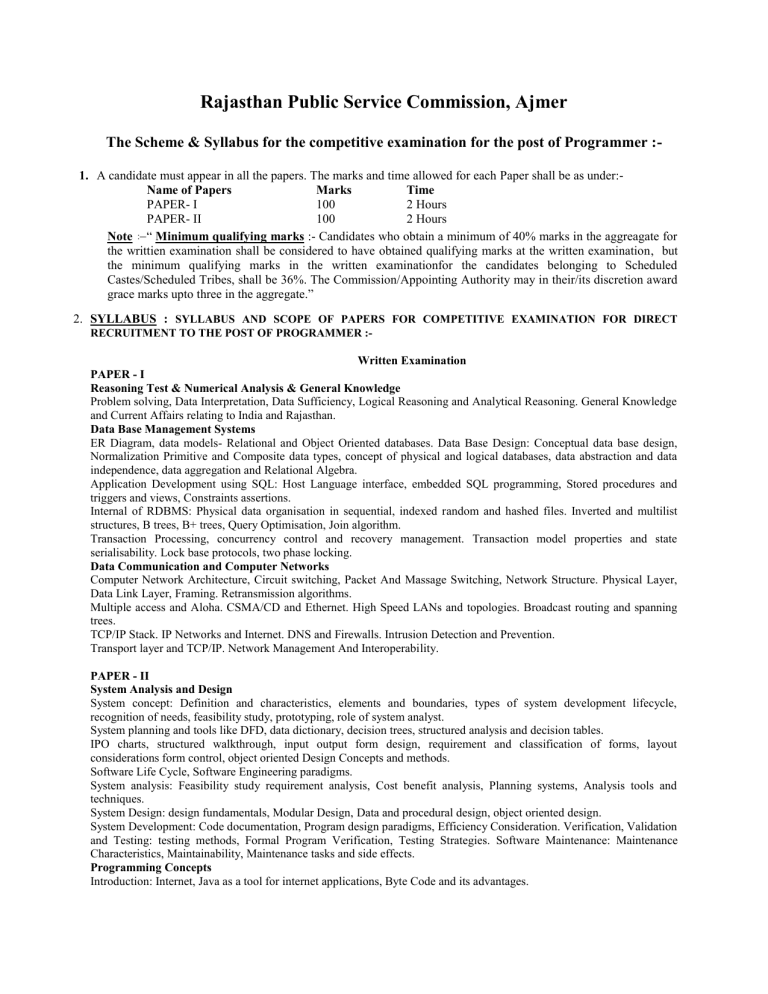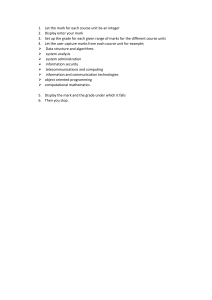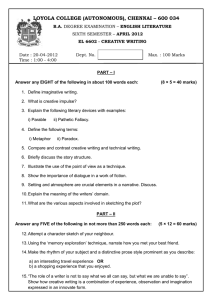
Rajasthan Public Service Commission, Ajmer The Scheme & Syllabus for the competitive examination for the post of Programmer :1. A candidate must appear in all the papers. The marks and time allowed for each Paper shall be as under:Name of Papers Marks Time PAPER- I 100 2 Hours PAPER- II 100 2 Hours Note %&“ Minimum qualifying marks :- Candidates who obtain a minimum of 40% marks in the aggreagate for the writtien examination shall be considered to have obtained qualifying marks at the written examination, but the minimum qualifying marks in the written examinationfor the candidates belonging to Scheduled Castes/Scheduled Tribes, shall be 36%. The Commission/Appointing Authority may in their/its discretion award grace marks upto three in the aggregate.” 2. SYLLABUS : SYLLABUS AND SCOPE OF PAPERS FOR COMPETITIVE EXAMINATION FOR DIRECT RECRUITMENT TO THE POST OF PROGRAMMER :- Written Examination PAPER - I Reasoning Test & Numerical Analysis & General Knowledge Problem solving, Data Interpretation, Data Sufficiency, Logical Reasoning and Analytical Reasoning. General Knowledge and Current Affairs relating to India and Rajasthan. Data Base Management Systems ER Diagram, data models- Relational and Object Oriented databases. Data Base Design: Conceptual data base design, Normalization Primitive and Composite data types, concept of physical and logical databases, data abstraction and data independence, data aggregation and Relational Algebra. Application Development using SQL: Host Language interface, embedded SQL programming, Stored procedures and triggers and views, Constraints assertions. Internal of RDBMS: Physical data organisation in sequential, indexed random and hashed files. Inverted and multilist structures, B trees, B+ trees, Query Optimisation, Join algorithm. Transaction Processing, concurrency control and recovery management. Transaction model properties and state serialisability. Lock base protocols, two phase locking. Data Communication and Computer Networks Computer Network Architecture, Circuit switching, Packet And Massage Switching, Network Structure. Physical Layer, Data Link Layer, Framing. Retransmission algorithms. Multiple access and Aloha. CSMA/CD and Ethernet. High Speed LANs and topologies. Broadcast routing and spanning trees. TCP/IP Stack. IP Networks and Internet. DNS and Firewalls. Intrusion Detection and Prevention. Transport layer and TCP/IP. Network Management And Interoperability. PAPER - II System Analysis and Design System concept: Definition and characteristics, elements and boundaries, types of system development lifecycle, recognition of needs, feasibility study, prototyping, role of system analyst. System planning and tools like DFD, data dictionary, decision trees, structured analysis and decision tables. IPO charts, structured walkthrough, input output form design, requirement and classification of forms, layout considerations form control, object oriented Design Concepts and methods. Software Life Cycle, Software Engineering paradigms. System analysis: Feasibility study requirement analysis, Cost benefit analysis, Planning systems, Analysis tools and techniques. System Design: design fundamentals, Modular Design, Data and procedural design, object oriented design. System Development: Code documentation, Program design paradigms, Efficiency Consideration. Verification, Validation and Testing: testing methods, Formal Program Verification, Testing Strategies. Software Maintenance: Maintenance Characteristics, Maintainability, Maintenance tasks and side effects. Programming Concepts Introduction: Internet, Java as a tool for internet applications, Byte Code and its advantages. Object Oriented Programming and Design: Review of Abstraction, Objects and other basics, Encapsulation, Information hiding, Method, Signature, Classes and Instances, Polymorphism, Inheritance, Exceptions and Exception Handling with reference to object modeling, Coupling and Cohesion in object oriented software. Object Oriented Design – Process, Exploration and Analysis. Java Programming Basics: Variables and assignments, Input and Output, Data Types and Expressions, Flow of control, Local variables, Overloading Parameter passing, this pointer, Java Object Oriented Concepts: Use of file for I/O, Formatting output with stream functions, Character I/O, Inheritance, Public and private members, Constructors for initializations, Derived classes, Flow of Control Arrays-Programming with arrays, arrays of classes, arrays as function arguments, Strings, Multidimensional arrays, Arrays of strings, vectors, Base classes. Introduction to JSP, RMI, Java Applets and servlets. Introduction to DotNet framework and visual programming interface. Note for general guidance forPROGRAMMER: (i) The standard of the paper will be that of a degree examination of a University established by law in India. A brief outline of the scope of each paper is given in this Schedule for general guidance of candidates but is not intended to be exhaustive. (ii) All papers unless specifically required, shall be answered either in English or in Hindi, but no candidate shall be permitted to answer any one paper partly in Hindi or partly in English unless specifically allowed to do so. (iii) If a candidate's hand-writing is not easily legible, a deduction will be made on this account from the total marks otherwise accruing to him. (iv) Questions of question paper of examination may be of multiple choice type or descriptive type or both types. (v) Credit will be given for orderly, effective and exact expression combined with due economy of words in all descriptive questions of the examination paper(s)." --------


